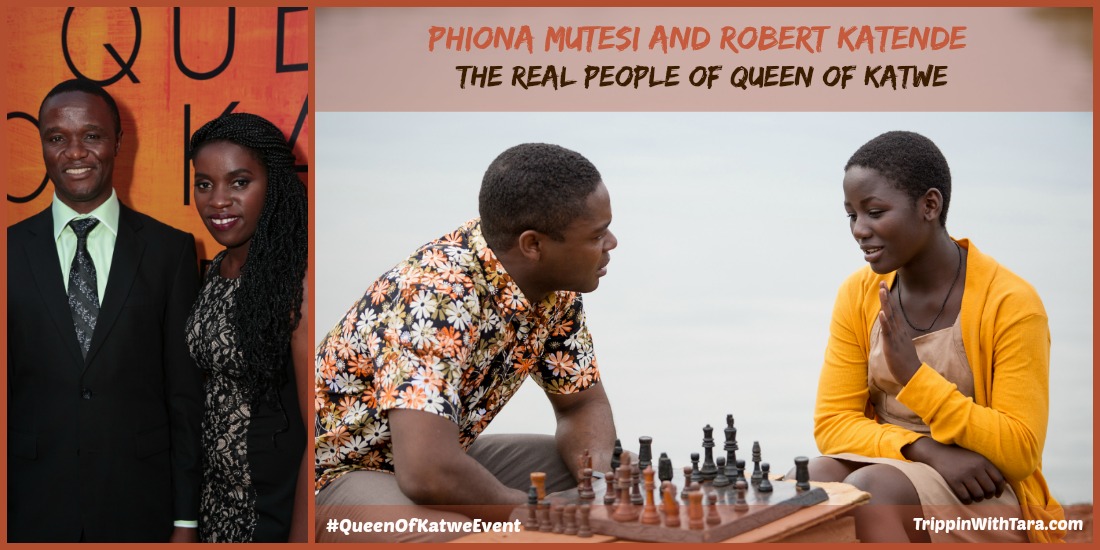
One of my favorite type of interviews are the ones with the real-life people portrayed in a movie. Phiona Mutesi (Madina Malwanga) and Robert Katende (David Oyelowo) are the reason Queen of Katwe exists. Though the story is of Phiona’s life from the streets of Katwe to a champion chess player, her story would not be the same if it weren’t for Robert. Knowing the movie is very true to life, speaking to these two was an honor. They are two very special people.
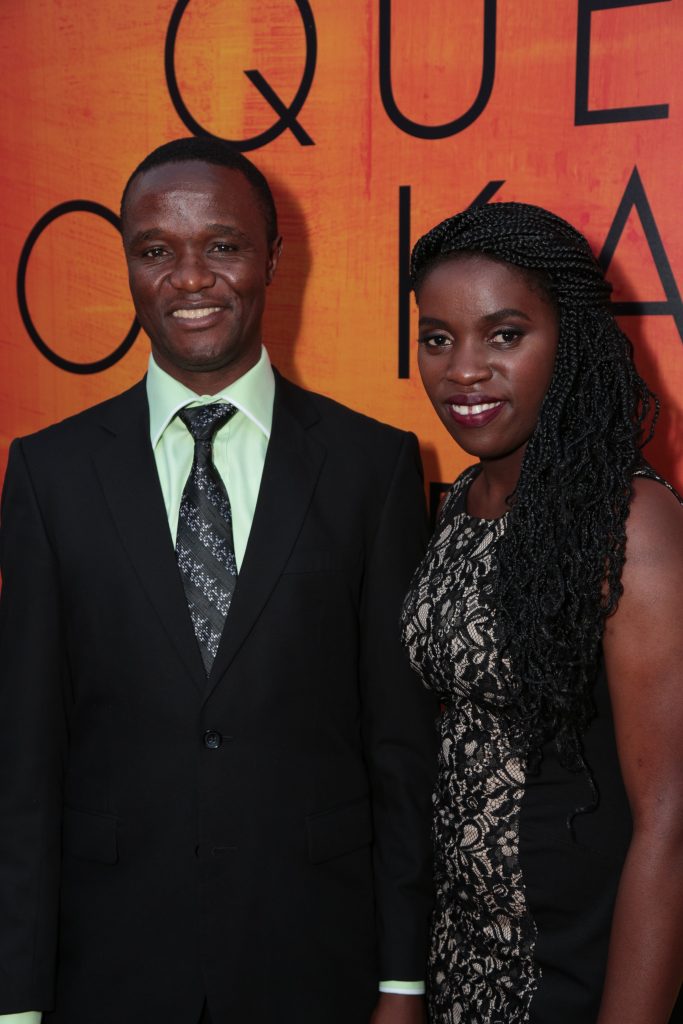
Phiona Mutesi and Robert Katende
Queen of Katwe is such an amazing story. How does it feel to see yourself portrayed on the big-screen and shared with the world?
Phiona: Well, it’s interesting, I cannot believe it.
In the film, your character wants to be a Grand Master. Has it happened yet?
Phiona: No. I’m a Candidate Master.
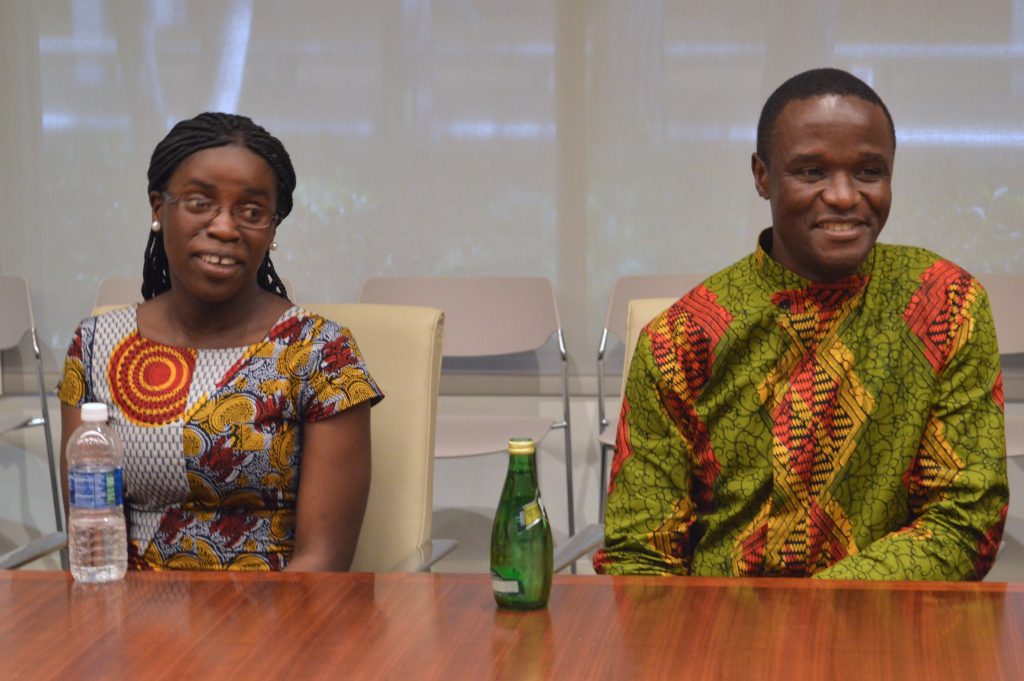
Photo Credit Carol Jones/AllMomyWants.com
What life lessons do you think people of all ages can learn from chess?
Robert: There are several just generally in life, and there are many values that we meet on a daily basis in our lives; In a child’s life you can involve them well to the platform of chess. You can tackle abstractive thinking, problem-solving, decision making, weighing options, and being responsible. Chess kind of mentors you in finding value and where you have to get comfortable with your decisions and don’t only make moves.
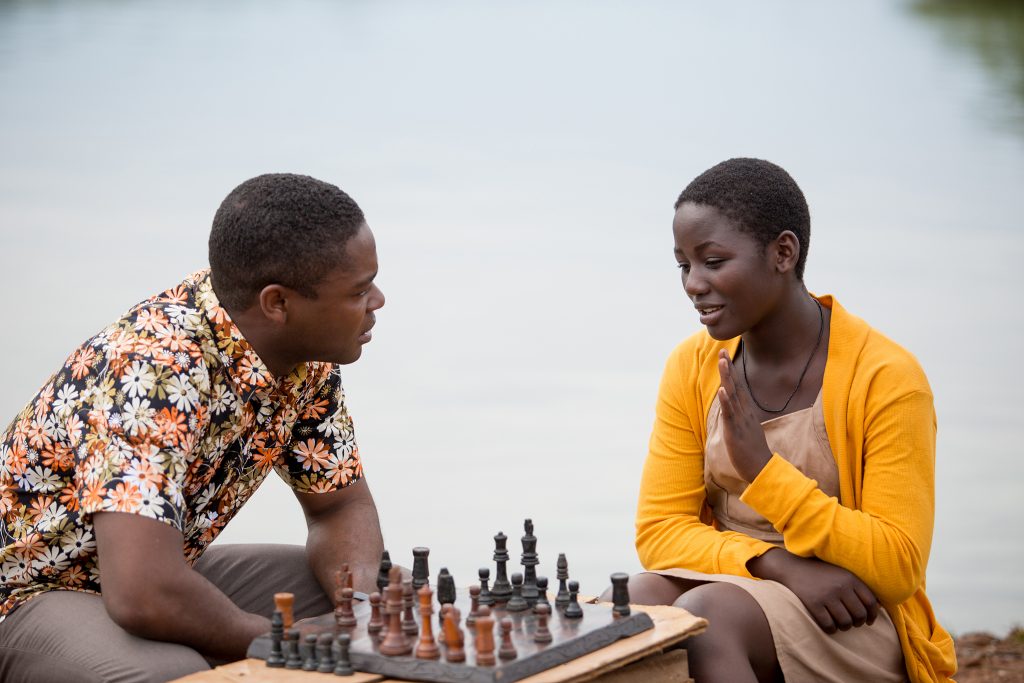
You should have a plan; you should have an objective, an activity objective. It gives you an opportunity to where you can have ideas and try to figure out how to bring them to reality. So you must get input in the integration of these values and principles from the game into your lifestyle.
Is the movie as true to life as it could be?
Phiona: Well, I liked it when I saw it. I couldn’t think that I was watching myself. But it was my first time in the big theater. I was on the Red Carpet; I believe it was just my first time. I’ve never been in such a situation. But I feel like I shouldn’t be there, like, shouldn’t it be someone else.
You’re supposed to be here. You belong here.
Phiona: But it feels too huge for me.
Can you talk about mentorship and how that played a role in your life?
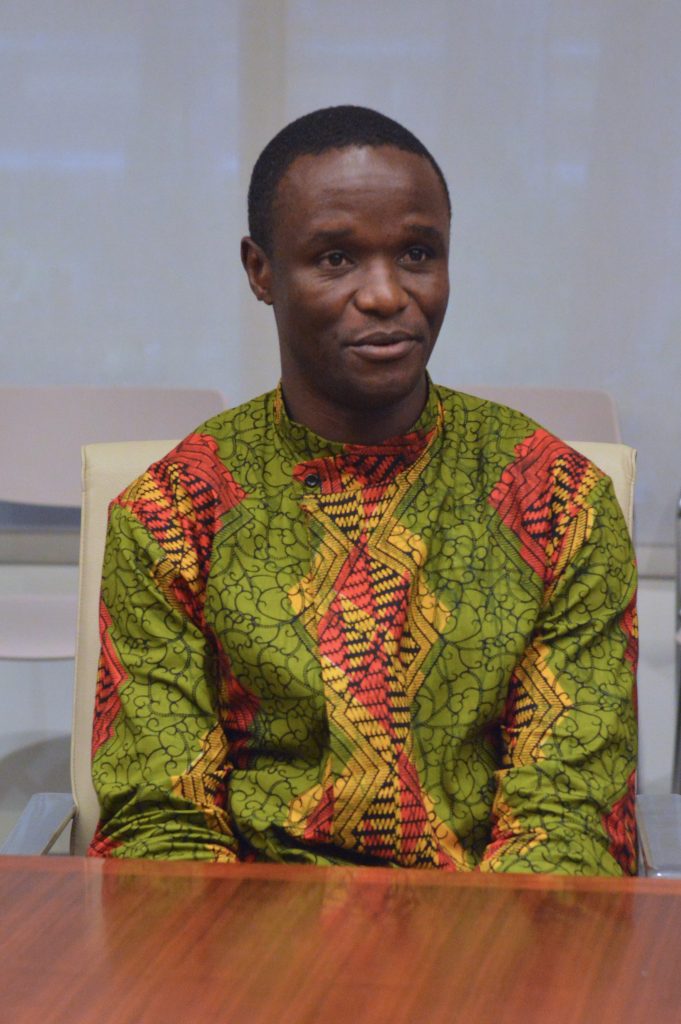
Robert: Yeah, surely it is something remarkable. I firmly believe maybe my overall team has done it. I have learned a lot about being a father. Before I had a family, I was more in training, so the kids taught me so much about tolerance, patience and embracing each one’s ability.
Because when it comes to the programs, the focus is not so much about chess, but it’s more of focusing on an individual. And the children have different abilities; different perspectives of life, and now you find yourself in this dilemma where you have to look at each child as an individual. And to me, it’s more of a community investment. You choose to be in there and see how this is important to them.
And then I did find where is the strength of this one like they are the ones leading most of the programs because they have turned out to be good leaders. But I remember ten years back; a good example was Richard. So this is the young boy who volunteered to keep our chess boards current from the beginning. And then, he was keeping this chess board, and then one time, almost like six months, he came on and said, “Coach, I think we need to find somewhere else to keep our board.”
Why? And then he said, “No, when my uncle comes back home, he comes back drunk, and he fights with Auntie, and so they will break our board.” Now, this hit me, and I almost shed tears because for him, it was for the board, and me, I was moved to think what kind of trauma does this child go through at home? So it takes you beyond what you think when it comes to mentorship. I’ve many times find myself going beyond the actual child, and going even to the people behind the child. Those who don’t have them, I got an opportunity to get to adopt them so that I am with them now.
You can find them in my home, and there are about eight kids over there. We sometimes even mentor them who know how to play chess. So it’s now more like a big family. But mentorship is not something you can just say it’s on and then off. It’s an ongoing process. And it’s not like, I will come and teach you, and then go away, but you allow them to learn your weaknesses, to learn how to face difficulties, how you respond to them.
It’s not a short case kind of situation, but you’re more like living with them on a daily basis, and they learn the positive way how to react to grief; how to respond to calamities if they occur. So you are their only model. They’re there to pick every lesson from you, so they become part of you. You open your home; sometimes I tell people that they are part of you; they give you a call; they come; they say, “coach, we need to come.” So it is an ongoing selfless living.
Can you tell us where you started with the pioneers and where you are now with your chess academy?
Robert: Yeah, I started it in 2002, and it started stabilizing in 2004. There were six kids, and I’ve been dealing with them for over now twelve years. The way I keep some of them, in the age, like Phiona, had, like, one year and a half. She was nine, and now she’s twenty. So they have now become young adults.
And when I took them in they had not any schooling. Benjamin is now qualified as a physics and math teacher. He’s now; he’s just graduated in June. Phiona, she’s just completing high school to go to university next year. So it’s a remarkable journey, for me to see them. And, besides they have professional kind of goals, they are naturally becoming leaders. Like Phiona, it’s not just like a coincidence, but it’s like a strategy on starting to give them some sense of responsibility. Then also enabling them to realize that there is something that they can offer at even their lower level. So they are naturally in this that they should grow.
I have a question about something that you said in the book about stepping out of the boat and how you react to fear? And Phiona, how to react when you feel defeated like you felt in Russia when you were crying and devastated. How do you react in those situations?
Robert: Yeah, that is true, but in most cases it is fear. It hinders a lot in many cases especially for the children; that they have nothing to relate to, so no one has ever done it. They cannot connect. So it’s more like, no, you step out. You be there first. You take that responsibility. We just offer real-life situations.
Then the question now is, what do you think is going to change us? You see yourself; Ask the person, what’s going to change this turnaround, to make this happen. So it’s like you start to instill a sense of discipline and responsibility. You need to see it from their perspective; not look at all- I wish my aunt had done this; oh, I wish my mom was available, but and my personal life, I tell them, look at me.
I’m a typical orphan; I never knew that things would ever change. But in every case, I had to keep on trying. I’d rather try than fail to try, and then I say it didn’t work out. There are moments when I go- I wanted so much to do. I was really good in academics, but I can imagine what you are reading today. You have exams in two weeks, but you’re not sure whether you’re going to see them because you don’t have, you don’t realize the future.
So you ask many times, why should I? If it doesn’t happen, I will have done my part. So that’s the kind of approach I take.
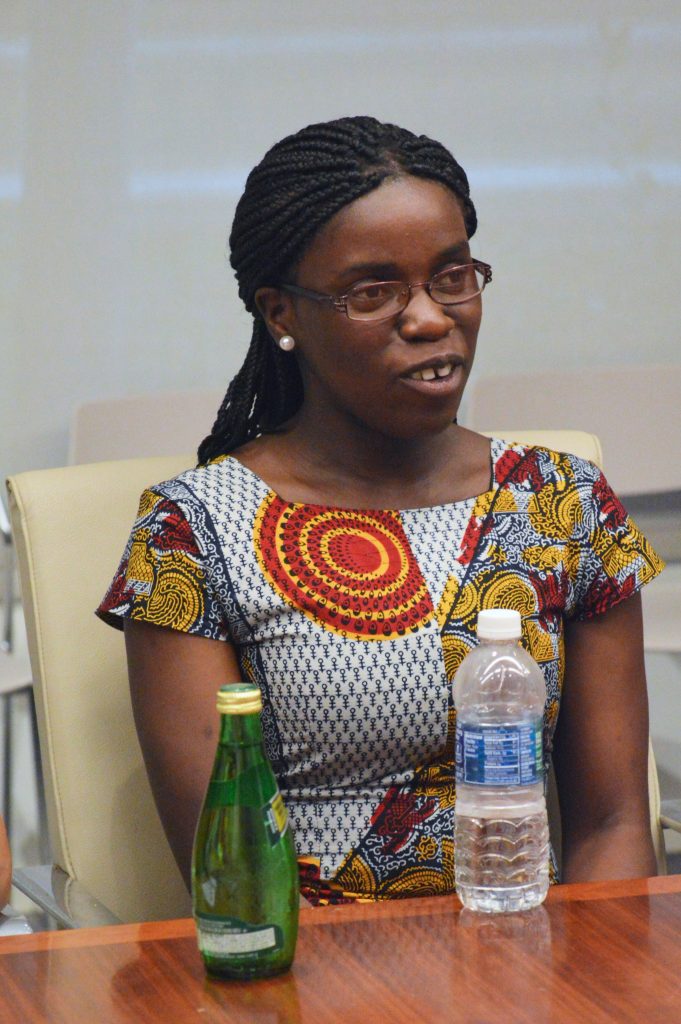
Phiona: My reaction whenever I would lose a game, most of the time I would cry, like with the pain of the pressure, that’s when I cry most. Like whenever I was in Uganda, I could win most of my games, so here I am; I’m coming to Russia; I thought everything is going to be easy. I forgot that this is a different experience from Uganda and, so from that, I think I got a great experience and got to learn a lot, so it doesn’t affect me anymore. Whenever I lose, it’s just part of the game. I just had to learn from that.
Phiona, you’re definitely and inspiration. What advice would you give to a young girl that’s scared of stepping out?
Phiona: Have hope in everything you’re doing, and just be hard working. Have a dream, and say “I want to be this in my life.”
What was it like working with Madina and David who played you in the film? Did you work in close collaboration with them? How much did you get to coach your character on set?
Phiona: Well, I wasn’t on set. I met Madina once. When I talked to Madina, it was like our lives were similar. So I ended up coaching her. So I was with Mira, she’s been coming to the academy.
Robert: Yeah, and I had an opportunity to really not do much, but I think I did more from the start. It’s very fun watching, and even on set, I think to me, it was more intimidating because I believe that David never portrayed someone’s life. That was a big challenge, but he would come to me asking every time, “Robert, anything you can find that is not in line, let me know.”
And then even before he goes into character, he would come and say, “Robert, how do you say this?” So I’d just go through his lines; what would you say to Sara because you are in this situation? He wanted to know this to make sure that he’s in line with everything.
What has surprised you the most in bringing your story to the big screen?
Robert: I would say the whole experience was quite surprising because it’s something which I could never have imagined in my life. And two, it just proved to me a sense of awareness that you get some encouragement of what you’re doing because you step out to do this. I will find myself just doing that without even knowing, that it could be anything big, even in the country itself. So to me, that was remarkable because when I look back to my childhood…
This morning, in fact, when I was at the hotel, I was trying to calm down, and I was trying, you know, like, even the whole country now will try to ask, where is Robert? And yet before, I remember the times when I would even call radio stations seeking for support for education, and no one would ever bother. You’ve got to look for jobs; you will know no one knows you. So it’s quite amazing to see, that stands out to me.
Queen of Katwe is now open in U.S. theaters everywhere!
Facebook | Twitter.com (#QueenOfKatweEvent) | Instagram | Website
*I was invited by Disney to experience the Queen of Katwe press event to share my experience. All opinions are my own.
- You Have to Remember – 9/11, 20 Years Later - September 11, 2021
- Creating the Perfect Look with a Maxi Dress - October 20, 2020
- Brand Better Giveaway - October 6, 2020


Leave a Reply